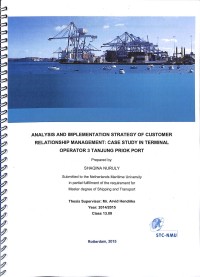Analysis And Implementation Strategy of Customer Relationship Management: Case Study In Terminal Operator 3 Tanjung Priok Port
Indonesia is an archipelago that has the territorial waters of two-thirds of the total area. As one of the largest State-owned Enterprise in the field of port services in Indonesia, IPC has very varied customers. However, until now the IPC have not mapped the customer yet, whereas vital relationship with the customer to be able to retain current customers and attract new market. Data customer management can do by customer profiling, the model used are RFM and K-Means Clustering. RFM is one of the customer segmentation model based on customer behavioral habits when making transactions with service provider, several number of articles shows that the RFM has been applied to a number of industries to support the process of customer segmentation. If customer segments are already being identified, there is an understanding of customer differentiation, which makes CRM more suitable.Due to implementation of new regulation on maritime and shipping sector in Indonesia (Law No.17 Year 2008), it is necessary for IPC management to maintain their customer and building long time partnership in order to establish strong relationship in business activity. Moreover, in line with IPC transformation and reform, the company needs to clarify its overall marketing strategy with the following implementation of Customer Relationship Management Terminal Operator 3 is one of the operator terminal managed by the management of the Tanjung Priok Port, these terminal has several business services includes: International Container Terminal, Domestic Container Terminal, International General Cargo, Domestic General cargo, Storage. These terminal faces challenges in competition, not only intra-port competition (between terminal operator in one port area), but also inter-port competition (port in the same area) and also intermodal transport competition (rail, land transport, air transport from and to port).
The purpose of this thesis project is to propose CRM initiative strategy for Terminal Operator 3 of Tanjung Prick Port and how to be implemented. Customer profiling using K-means customer clustering method will use as a basis information in order to provide suggestion for CRM strategy and implementation in Terminal Operator 3 of Tanjung Prick Port. K-means customer clustering is a simple process for approximating the mean (vectors) of a set K- groups, where K represented by the initial group centroids.
Ketersediaan
Informasi Detail
- Judul Seri
-
-
- No. Panggil
-
TD MG NUR a C.1
- Penerbit
- Netherlands : Netherlands Maritime University., 2015
- Deskripsi Fisik
-
ix, 52 p., : table : illus : 30 cm
- Bahasa
-
English
- ISBN/ISSN
-
-
- Klasifikasi
-
MG
- Tipe Isi
-
-
- Tipe Media
-
-
- Tipe Pembawa
-
-
- Edisi
-
-
- Subjek
- Info Detail Spesifik
-
-
- Pernyataan Tanggungjawab
-
Shaqina Nuruly
Versi lain/terkait
Lampiran Berkas
Komentar
Anda harus masuk sebelum memberikan komentar

 Karya Umum
Karya Umum  Filsafat
Filsafat  Agama
Agama  Ilmu-ilmu Sosial
Ilmu-ilmu Sosial  Bahasa
Bahasa  Ilmu-ilmu Murni
Ilmu-ilmu Murni  Ilmu-ilmu Terapan
Ilmu-ilmu Terapan  Kesenian, Hiburan, dan Olahraga
Kesenian, Hiburan, dan Olahraga  Kesusastraan
Kesusastraan  Geografi dan Sejarah
Geografi dan Sejarah